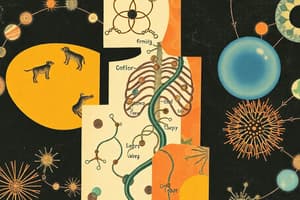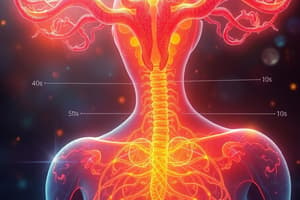Podcast
Questions and Answers
What is the primary function of CamScanner?
What is the primary function of CamScanner?
To scan documents using a smartphone camera.
How does CamScanner optimize scanned documents for clarity?
How does CamScanner optimize scanned documents for clarity?
By using image processing techniques such as enhancement and cropping.
What additional features does CamScanner offer besides scanning?
What additional features does CamScanner offer besides scanning?
PDF conversion and cloud storage integration.
In what contexts might one find CamScanner most useful?
In what contexts might one find CamScanner most useful?
What platforms is CamScanner available on?
What platforms is CamScanner available on?
Flashcards
CamScanner
CamScanner
A mobile application for scanning documents.
App
App
Software application for a mobile device.
Document Scanning
Document Scanning
Converting paper documents into digital files.
Mobile Device
Mobile Device
Signup and view all the flashcards
Digital Files
Digital Files
Signup and view all the flashcards
Study Notes
Endocrine System
- Endocrine and nervous systems communicate in the body
- Nervous system is faster, but endocrine response is not always slower
- Norepinephrine and insulin produce fast responses; some hormones have fast responses
- Functions of the endocrine system include homeostasis, growth regulation, reproduction regulation, and maturation regulation
Hormone Classification
- Hormones are chemical substances produced by endocrine glands
- Steroid hormones are derived from cholesterol and are not soluble in blood; they need transporters
- Protein hormones are soluble in blood and do not require transporters
- Steroid hormones cross cell membranes and act on intracellular receptors
- Protein hormones do not cross cell membranes and act on extracellular receptors
Hormone Receptors types
- Hormone receptors are glycoprotein structures that bind with hormones
- Hormone quality, quantity, and sensitivity may be impacted by physiological conditions
- Other hormones or hormones acting on receptors can also affect hormone actions
Hormone Regulation
- Hormone-level changes may affect receptor number (upregulation or down regulation)
- Example: During parturition (childbirth), oxytocin receptor number increases in uterus, and estrogen increases receptor sensitivity
- Insulin levels, when high, trigger down-regulation of receptors to decrease insulin synthesis
Thyroid Hormone
- Thyroid hormone is stored in follicles and transported in the blood with proteins
- Thyroid hormone acts on intracellular receptors
- Thyroid hormone has a long half-life
Catecholamines
- Catecholamines do not cross cell membranes
- They are stored in granules and transported in blood, often without protein carriers
- Catecholamines act on extracellular receptors
- Catecholamines have a short half-life
Hormones: Site of Action
- Autocrine action: hormones act within the organ where they are produced
- Paracrine action: hormones act on nearby cells
- Endocrine action: hormones released into the blood and act on distant target organs
Mechanism of Action of Protein Hormones
- Protein hormones work through a cascade of biochemical reactions
- cAMP (cyclic AMP) is a second messenger often involved
- Other second messengers like protein kinases, calcium-calmodulin systems, and phosphatidyl inositol systems also exist
- Second messengers influence cellular functions, often activating or inactivating enzymes through phosphorylation
Mechanism of Action of Steroid and Thyroid Hormones
- Steroid and thyroid hormones bind to intracellular receptors
- The hormone-receptor complex acts on DNA sequences, regulating gene transcription
- Binding alters DNA-binding domain conformation causing a downstream effect in the cell
Studying That Suits You
Use AI to generate personalized quizzes and flashcards to suit your learning preferences.




